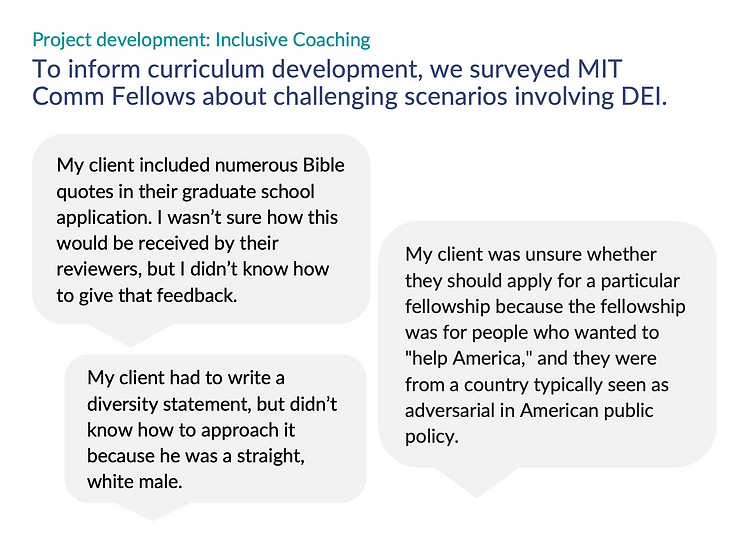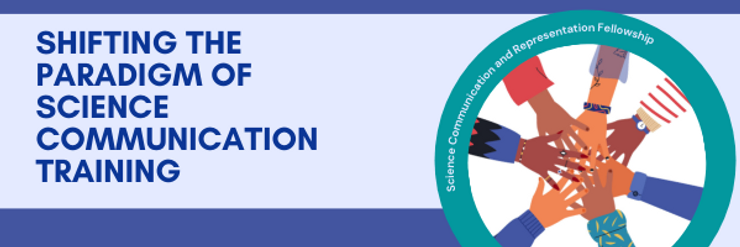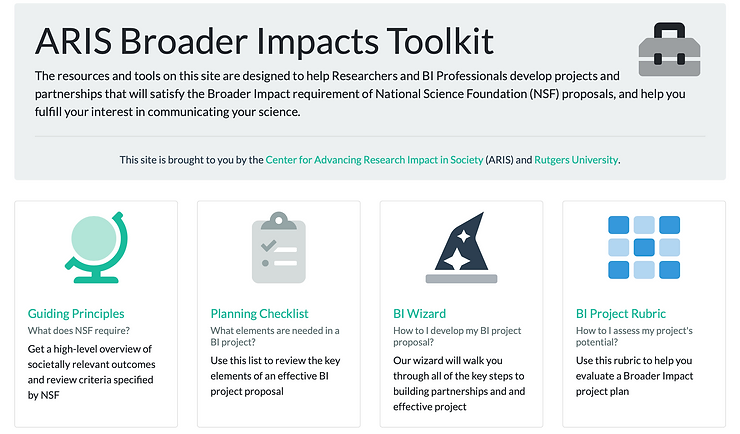Science Communication Trainers Network 2021 Convening Coverage: Part 1
SciCommBites attended the 2021 Science Communication Trainers Network convening in December. Here’s part one of our summary of the sessions that happened at the convening, focused primarily on trainer-specific topics.
Community Projects and Collaborations
Jacqueline Goldstein, edited by Niveen Abi Ghannam
The session on Community Projects and Collaborations featured inclusive science communication. Proposals to develop and distribute new inclusive science communication curricula were presented by the MIT Communication Lab and by a partnership between the Metcalf Institute at the University of Rhode Island and the Knight Center of Environmental Journalism at Michigan State University.
Inclusive Coaching
The MIT Communication Lab trains engineering graduate students and postdocs as peer coaches in technical communication. The core philosophy of the lab, which launched in 2013, includes peer leadership, community building, and inclusion.
Building upon that philosophy, Dr. Diana Chien of MIT Communication Lab presented two workshop curricula, funded by SCTN, which are currently in development and will be released under Creative Commons. The first curriculum, a Coaching Best Practices Workshop, is a version of their fundamental workshop that introduces communication and peer-coaching principles and provides guidelines and activities that can be adapted for use in various contexts.
The second curriculum is for an Inclusive Coaching Workshop. The workshop is being designed for peer coaches who have some experience and who want to improve their skills when facing challenges involving diversity, equity, and inclusion (DEI).

To help peer coaches feel better equipped to navigate challenging scenarios with equity and care, the Inclusive Coaching workshop will introduce principles of social justice, where social and communication norms are critically analyzed, and principles of motivational interviewing, where active listening and reflective responding help clients make active choices while considering their values and goals.
The Coaching Best Practices curricula will be released to the public in Summer 2022. The Inclusive Coaching curricula will be piloted with members of SCTN in Spring 2022 and will be released to the public the following summer.
Project SCARF
The Metcalfe Institute at the University of Rhode Island is a global leader in amplifying marginalized and underrepresented voices in science, journalism, and science communication. The Knight Center of Environmental Journalism at Michigan State University is a leader in innovative research on communicating complex environmental issues while maintaining traditional values of fairness and accuracy. Together, they have developed a project to shift the paradigm of science communication training toward an intercultural approach.
Dr. Sunshine Menezes and Dr. Bruno Takahashi presented the five-year project, named the Science Communication and Representation Fellowship (SCARF). Funded by the National Science Foundation, the project will address three systemic problems in the landscape of science communication training:
(1) a universalist approach to science communication training that is rooted in whiteness, ableism, and heteronormativity;
(2) a lack of diversity amongst science communication trainers and trainees; and
(3) a dominant perception at academic institutions that science communication does not count towards promotion and tenure.

SCARF will develop new training curricula in collaboration with science communicators and trainers of intersectional identities and with the help of intercultural communication theory. SCARF Fellows will be recruited from pre-tenure STEM faculty of color representing disciplines related to climate change science (either water, agriculture and food security, or energy). SCARF Fellows will then be introduced to journalists around the country to be established as sources of reliable and inclusive science. SCARF will also help fellows produce a novel peer-reviewed podcast, a form of media that is at the intersection of popular communication and academic rigor.
If you, or someone you know, is interested in becoming a SCARF Fellow, you can learn more and apply here.
NSF Broader Impacts and ARIS
Niveen Abi Ghannam, edited by Jacqueline Goldstein
This session featured the Center for Advancing Research Impact in Society (ARIS) at the University of Missouri, which is funded by the National Science Foundation to support researchers in developing their Broader Impacts (BI) section in proposals.
ARIS Science Communication Director, Dr. Jory Weintraub, explained that NSF proposals have been assessed on the same two criteria since 1997: intellectual merit and broader impact. However, the expectations for the BI component have increased since then.
To support the development of BI impacts, ARIS created the BI Toolkit, which includes Guidelines that outlines five basic questions scientists should consider when writing NSF grants. The same questions are considered by reviewers when evaluating proposals. The toolkit also includes the BI wizard, an interactive online tool that helps researchers develop a viable budget and explore evaluation strategies, amongst other considerations. It even suggests outreach and engagement literature citations!

ARIS Fellowships offer science communication practitioners opportunities to engage in BI resource development and research. One Fellowship team, Dr. Dione Rossiter and Dr. Jacqueline Goldstein, is currently developing a companion to the BI Toolkit that integrates existing principles and practices of inclusive science communication. This project aims to develop and test the tool by the end of Summer 2022.
ARIS hosts an annual Summit for international community members to come together and explore broader impacts (BI) topics. Proposals for the 10th Annual ARIS summit (May 1-4, 2022) are currently being accepted.
Condescendingly Yours: how do scientists see themselves in relation to their publics
In this interactive session, Alexandra Anghelescu shared her journey as a science communicator, science communication trainer, and science communication researcher in Romania.
Alexandra doesn’t only train scientists in best communication practices, she also researches best practices and develops and assesses interventions influencing scientists’ intentions to interact with the public. Through her research, Alexandra has observed scientists engaging condescendingly with the public, treating the public as recipients, and not participants, of knowledge. Through her observations, however, Alexandra realized that as a trainer she was also treating scientists as a recipient public. Alexandra’s observations and self-reflection changed her perspective as a trainer.
Her journey has led her to question the role of power dynamics and status within science communication. She has questioned the extent to which scientists are condescending towards their publics as a mechanism to protect their status and shield them from being attacked by those publics (as well as their scientific colleagues). The discussion at the convening took a philosophical spin on scientific ego and discussed possible approaches to addressing perceptions of status by scientists, including inclusive training, active listening and two-way engagement, motivational interviewing, and promoting social and emotional competencies, such as empathy and humility. These approaches reflect the focus on inclusive science communication throughout the convening, and represent the focus looking forward

